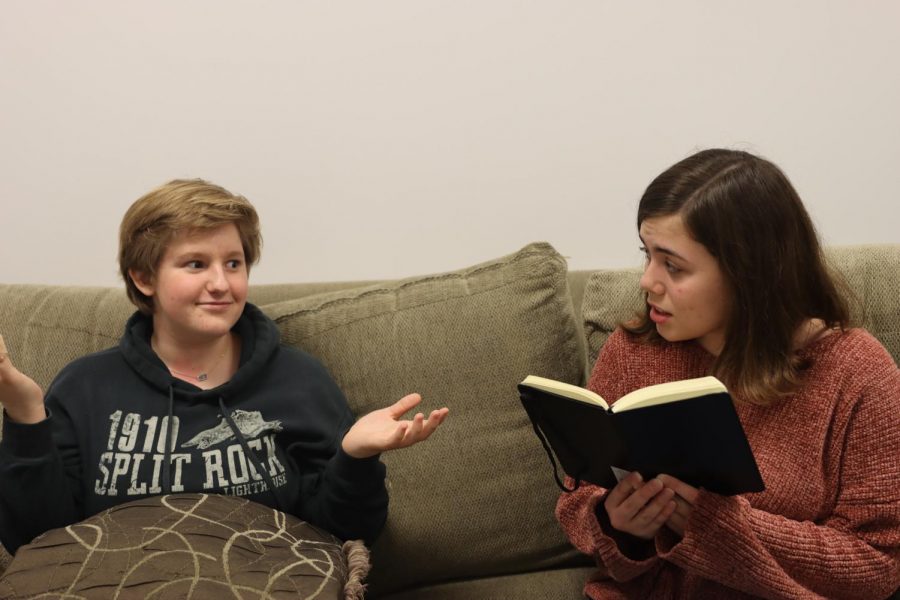It’s Okay to Not Be Okay
Addressing and debunking the stigma surrounding therapy
The relationship between a therapist and client is very unique, and often times they can be very close and comfortable with each other.
February 7, 2020
Therapy is often seen as very taboo, a place where quote on quote “crazy” people go to cope. In reality, therapy is a very normal and common experience, meant to help improve the mental health and emotional wellbeing of the public. There is no set list of people who can attend therapy, purposes for going can vary from legitimate mental illnesses to stress at work.
Junior Abby Shields attended therapy for about a year to treat her anxiety and depression, while freshman Alec Linnemeyer attends therapy for different reasons.
“Very bad times were happening throughout summer and years prior, and I felt as if I needed to seek help,” Linnemeyer said. While he isn’t in therapy specifically for treatment, he’s still making the choice to better his mental health.
Ms. Rustemeyer, the crisis counselor, is no stranger to promoting good mental health. Her job consists of meeting with students referred by staff, usually students struggling with school or having family issues, and help them to work through their issues. She does so by setting goals, finding new ways to look at the problem, improving relationships, and teaching new skills and coping behaviors. In order to fulfill these duties, Rustemeyer has had extensive training and experience providing both psychological and psychosocial services, and is a licensed social worker.
“I may share info about helpful websites, apps, crisis helplines and school/community resources. I may conduct a suicide assessment if needed and help create a safety and support plan to resolve crisis. If needed, I may also advocate for students with teachers and parents, to help them understand the student’s needs and how to help,” Rustemeyer said. “I also provide training for district staff about mental health and crisis management, and help facilitate behavioral health programs.”
Rustemeyer also sponsors the Come Together club, a group focused on mental health and mental illness awareness.
“In club meetings, some Come Together students have courageously shared their own mental health struggles and what has worked for them. When teens hear other teens talking about this topic openly, I believe it is extremely powerful in helping to reduce the stigma about mental health,” Rustemeyer said.
She believes that counseling should be more normalized, and believes the current stigma is a huge issue, with a simple solution.
“By far, the best way to debunk the negative stigma is by all of us educating and inspiring the entire school community to take this on,” Rustemeyer said.
The easiest way to do this is to explain the benefits of therapy, which are very strong in number.
“Therapy is an opportunity to gain a better understanding of yourself – your emotions, strengths, goals and values. It can help you look at problems from different perspectives, figure out new solutions, and respond to upsetting events without completely freaking out. It can give you an ally and advocate if it’s been difficult trying to talk to parents, school staff or other adults. A therapist can help you learn how to set boundaries with family and friends, and develop skills to improve relationships,” Rustemeyer said. “You can learn how to think things through before making important decisions. You’ll learn coping strategies individualized for your needs, which are designed to help you feel more in control of your emotions. You’ll likely feel better about yourself and more confident in your ability to handle upsetting events in the future.”
Shields can attest to these benefits, and has personally grown during her time in therapy.
“It’s really made me comfortable with talking to people, whether it be new people or people I’ve known for a while, or talking about my emotions. Now I feel a lot more comfortable with communication,” Shields said. “I’m a lot happier overall as a person, I see myself as less this mental illness, and more as just who I am and what I like.”
Linnemeyer has had similar results.
“It [therapy] helped me become more social, actually, from being too isolated and staying in my room 24/7, I’m not a little bit more open to people and experience. It’s been a positive impact, very positive,” Linnemeyer said.
Students are certainly susceptible to stress, and more anxious thoughts.
“I think the structures in our traditional educational system can potentially put unnecessary pressures on students that often negatively impact mental health. I also think student social interactions (both inside and outside of school) have become much more complicated and potentially anxiety-provoking as a result of digital communication and social media,” Rustemeyer said. “Many teens are more socially isolated and engaging in more shallow, superficial and conflictual interactions. That’s not good.”
Seeking help is a courageous choice, and one you should be proud of. It’s not shameful to admit that the stress has gotten to you, and you can benefit from healthier coping mechanisms. Therapy is there to help, and it’s there for absolutely anyone who considers it. If you want to speak more on the subject with a mental health professional, and are considering getting more serious help, set up an appointment with Ms. Rustemeyer.
“Generally, if the student has been really uncomfortable and having trouble with day-to-day functioning for more than a month or two, it’s a good idea to talk with a mental health counselor,” Rustemeyer said.
If the problem is more severe, and you’ve been considering suicide, or self-harming, please contact the National Suicide Prevention Lifeline (800-273-8255), or the St. Charles Youth Connection Helpline (call 636-642-0642 or text BESAFE to 31658).















Elaine Thimyan | Feb 12, 2020 at 9:07 am
Loved this! Really thought out and just overall a good purpose
Brooke Huffman | Feb 12, 2020 at 10:27 am
Thank you so much, I’m glad you enjoyed it!